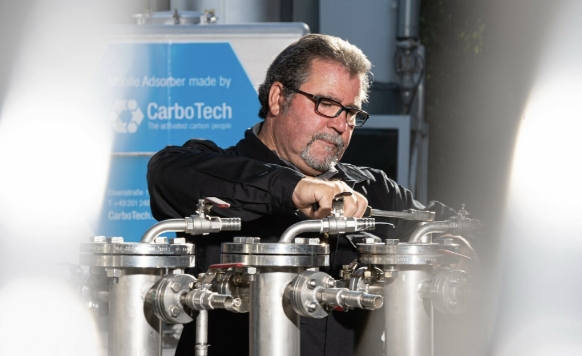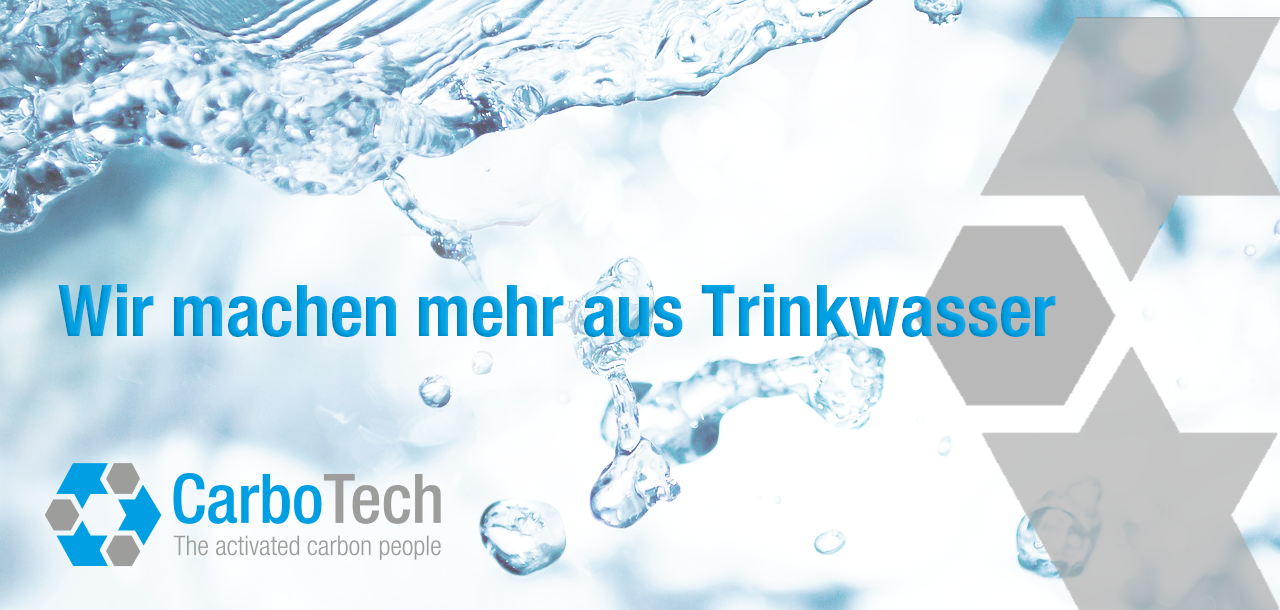- Service
- Sustainability

- Activated Carbon
- Applications
- Applications
- Air and Gas Purification
- Water treatment & waste water purification
- Food and beverage

- Fluid treatment
- Hydrogen purification
- Carbon molecular sieves (CMS)
- Individual applications

- Solutions
- About us
- News
Keyword-SearchEssen, 31.08.23 – This year in particular, the topic of drinking water has become massively more important due to the tightening of drinking water regulations and the PFAS issue (perfluorinated and polyfluorinated alkyl substances). Deservedly so, since it is our most important foodstuff and cannot be replaced. The explosiveness is obvious when there are new scandals about contaminated drinking water due to environmental disasters or man-made environmental scandals, because polluted or contaminated drinking water could reach every human being.
Therefore, the quality of drinking water is strictly regulated by law through the Drinking Water Ordinance, as well as various guidelines, legal principles or regulations. Especially since over the decades the ingredients of drinking water have become more diverse and complex, for example due to drug or PFAS residues.
As a full-service activated carbon manufacturer, CarboTech has been a competent solution provider for water and wastewater treatment plant operators, plant constructors and engineers for many years.
Activated carbon as the most important filter medium in the drinking water sector
Creating barriers against contamination is important in the entire process chain of drinking water production as a preventive measure.
“However, if the drinking water is already contaminated, a good filter medium is required to reliably remove a wide variety of impurities. Activated carbon in particular, in powdered or granulated form, is used here. In the interest of sustainability, renewable activated carbon made from coconut shells is increasingly being used.
Our certified activated carbon according to the standards DIN EN 12915 (for granular activated carbon) and DIN EN 12903 (for powdered activated carbon) give our customers the security of being able to maintain perfect drinking water quality,” says Alexander Sommer, Sales Manager for Drinking Water Applications at the CarboTech Group.
But it is not only the starting material of the activated carbon that brings a sustainability factor into play. The good reactivability of activated carbon (whether classically made from rock and charcoal or as a sustainable variant from coconut shells) also makes activated carbon a reusable and accordingly sustainable filter medium. With the expansion of the CarboTech fleet by a multi-chamber vehicle, where an exchange of activated carbon from old to new is possible in a single appointment, logistics are also made more sustainable and from a single source.
“Thanks to the large investment volumes made in recent years, it was possible to convert the site for the processing of drinking water coals. The focus was particularly on the existing production facilities, the storage, as well as the transport of highly sensitive activated carbons. These investments make it possible to now also offer reactivation using the fluidized bed for granulated and extruded activated carbons in the drinking water sector, something our customers and competitors are already happy to take advantage of,” explains Felix Niermann, operations manager of the CarboTech Group.
But what exactly is PFAS and what makes it so dangerous?
It is a collective term for so-called perpetual chemicals (PFAS: per- and polyfluorinated alkyl substances) which includes around 10,000 artificial substances. We encounter these in everyday life in a wide variety of forms: Clothing, cosmetics, coated pans. Because these chemicals are extremely stable, they can be deposited in the environment – even in the human body – and are hardly broken down there. They enter rivers, lakes and oceans via sewage treatment plants, which then have to be filtered intensively with our high-performance activated carbon products to break the cycle.
 Other articles
Other articles NewsCompanyInnovation
CarboTech wins RWW tender
CarboTech wins another major customer in the drinking water treatment sector and further expands its customer portfolio with RWW.
09.07.2024
Helena Kellner
NewsCompanyInnovation
CarboTech wins RWW tender
CarboTech wins another major customer in the drinking water treatment sector and further expands its customer portfolio with RWW.
09.07.2024
Helena Kellner
 NewsCompanyStructural
CarboTech continues to pursue growth trend towards the future
Essen-based activated carbon manufacturer takes next investment step, further ensuring the company's future viability.
28.06.2024
Helena Kellner
NewsCompanyStructural
CarboTech continues to pursue growth trend towards the future
Essen-based activated carbon manufacturer takes next investment step, further ensuring the company's future viability.
28.06.2024
Helena Kellner
 NewsCharitableCompanyEvents
CarboTech team at the EON company run
Team building for a good cause: CarboTech team runs 1,000 euros for a good cause at the EON company run.
24.06.2024
Helena Kellner
NewsCharitableCompanyEvents
CarboTech team at the EON company run
Team building for a good cause: CarboTech team runs 1,000 euros for a good cause at the EON company run.
24.06.2024
Helena Kellner
- Sustainability





